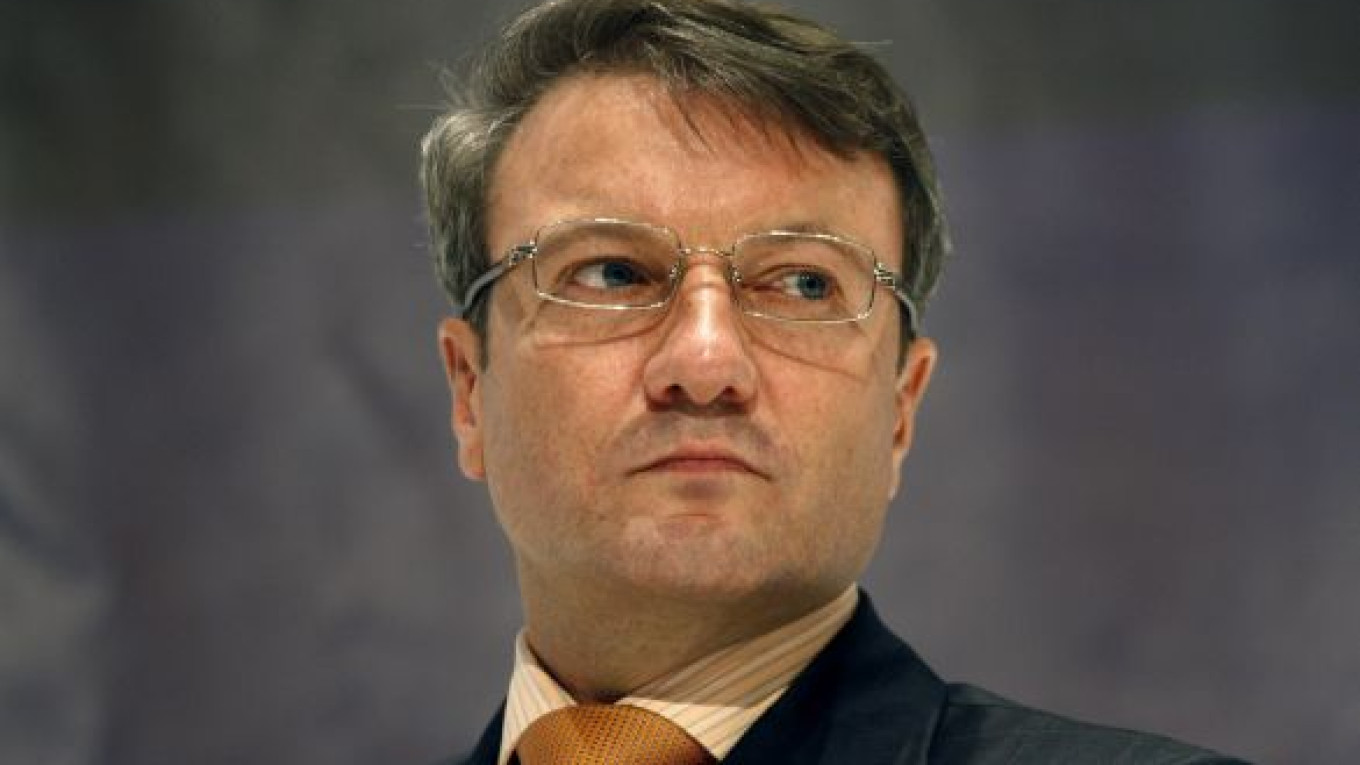Sberbank, the country's biggest lender and oldest bank, announced Friday the much-anticipated purchase of the private investment banking outfit, Troika Dialog, for $1 billion.
Amid the lurid green lighting and upbeat electronic music in Sberbank's Moscow headquarters, German Gref, Sberbank's chief executive officer and former minister of economic development, said the deal was a "logical step forward" and a "symbolic event for the Russian financial market."
Gref said a binding agreement will be signed in the last quarter of 2011 and that no decision had yet been taken on whether the Troika Dialog brand will be preserved.
The payment of $1 billion will see Sberbank acquire the 36.4 percent of Troika Dialog owned by Johannesburg-based Standard Bank and the 63.6 percent belonging to a shareholding group headed by chairman and chief executive Ruben Vardanyan.?
A further "earn-out" payment will be made in 2013 on the eve of the final stage of integration. This will be calculated as half of the difference between an average of the annual 2011-13 profits multiplied by 13.5 and the original $1 billion sum.
Gref said the expected yearly profit of Troika Dialog would be in the region of $200 million, putting the total cost of the deal for Sberbank at $1.85 billion.
But, "the lower the income, the lower the payment," he added.
Sberbank deputy chief executive Andrei Donskikh was more modest, estimating Troika Dialog's average annual profit at $173 million, and the final additional payment at $700 million, Interfax reported.
Sberbank has guaranteed that, even if market conditions are unfavorable, the payment will not fall below $200 million.
? Vardanyan will stay on at Troika Dialog at least until 2013, said Gref, who will head the company's supervisory board during the consolidation period.
The three-year integration process is likely to be an attempt by Sberbank to make sure there is no exodus of Troika Dialog employees and their profitable corporate clients.
The extra time, said Alexandra Lozovaya, an analyst at Investcafe, will help Sberbank "preserve the company's business."
If the deal had been concluded quickly, she added, "people and clients would have left."
Gref made of point of highlighting the "support and enthusiasm" from Troika Dialog staff for the announcement, but Citigroup said Thursday that it had hired some top bankers from Troika Dialog, Bloomberg reported.
Sberbank's shares traded down 1.02 percent at 98.75 rubles at market close on Friday after reaching a high of 100.16 earlier in the day.
The acquisition of Troika Dialog fulfills a long-held ambition of the former Soviet savings bank to offer a full range of financial services to corporations, as well as individuals, and to develop a global presence.
"We will become a meaningful participant in international markets," Gref said, adding that Sberbank will "expand and develop" Troika Dialog's offices in London and New York.
Standard Bank, which will sell its stake in Troika Dialog to Sberbank, was "excited but at the same time slightly sad," its chief executive officer Jacko Maree said.
The company may set up a small office in Moscow to continue its work in Russia, Maree added.
Any misery for Standard Bank brought on by the loss, however, will be tempered by the $72 million profit made on the $300 million investment it put into Troika Dialog in 2009 during the financial crisis.
The expansion of Sberbank, in which the Central Bank has a controlling stake, marks an increase of the state's presence in the financial sector, said Svetlana Kovalskaya, a banking analyst at Renaissance Capital.
"Two of the three [top investment banks] are going to be state," she said. The other big state-controlled investment bank is VTB Capital, whose successes have been a driving force behind Sberbank's interest in Friday's deal.
Entering the state-owned fold will give Troika Dialog greater access to the estimated $29 billion in government assets to be privatized over the next three years.
Sberbank is "interested" in Turkey, chief executive German Gref said Friday, but said the company was not in talks with state-run lenders Ziraat or Halkbank.
A Message from The Moscow Times:
Dear readers,
We are facing unprecedented challenges. Russia's Prosecutor General's Office has designated The Moscow Times as an "undesirable" organization, criminalizing our work and putting our staff at risk of prosecution. This follows our earlier unjust labeling as a "foreign agent."
These actions are direct attempts to silence independent journalism in Russia. The authorities claim our work "discredits the decisions of the Russian leadership." We see things differently: we strive to provide accurate, unbiased reporting on Russia.
We, the journalists of The Moscow Times, refuse to be silenced. But to continue our work, we need your help.
Your support, no matter how small, makes a world of difference. If you can, please support us monthly starting from just $2. It's quick to set up, and every contribution makes a significant impact.
By supporting The Moscow Times, you're defending open, independent journalism in the face of repression. Thank you for standing with us.
Remind me later.


